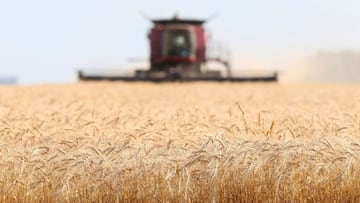Could the Ukraine-Russia conflict lead to global food shortages?
The price of wheat futures has increased 50% in the last two weeks and many food security experts are warning that the shortages are already being felt.


Known as the 'bread basket of Europe' Ukraine has seen a stark increase in hunger since the Russian invasion began. These increases are being felt around the world and the Executive Director David Beasley of the World Food Program (WEF) believes that the "The bullets and bombs in Ukraine could take the global hunger crisis to levels beyond anything we’ve seen before."
For the first time since 2008, the price of wheat futures have increased fifty percent. The Financial Times has highlighted that the last time such a quick increase was seen in global markets, protests broke out in forty countries and some experts believe that the rapid price hike contributed to the Arab Spring in 2011.
The Food and Agriculture Organization (FAO) has noted that global hunger was on the rise before the pandemic began, and the health crisis has only worsened the situation. Now the organization is warning that "supply chain and logistical disruptions on Ukrainian and Russian grain and oilseed production and restrictions on Russia’s exports will have significant food security repercussions."
The Food and Agriculture Organization have reported that Egypt, Turkey, Bangladesh, and Iran buy more than 60% of their wheat from Russia and Ukraine. The agency has also stated that all of these countries are still waiting for shipments to be filled. Whether or not they will receive the products is not clear.
There are around fifty countries that import more than thirty percent of their wheat from Russia and Ukraine, many of which are some of the least economically developed in the world.
See also:
What has the US proposed to support Ukrainians?
The US has pledged that it will allocate an additional $53 million to US AID, some of which will be sent to the WEF to "to provide lifesaving emergency food assistance to meet immediate needs of hundreds of thousands affected by the invasion, including people who are displaced from their homes and who are crossing the border out of Ukraine." However, the impacts of global shortages will not only be felt in Eastern Europe.
🚨 NEWS ALERT 🚨
— WFP Media (@WFP_Media) March 11, 2022
Families are being pushed to the limit in #SouthSudan as the country braces for its worst hunger crisis ever.
Full press release 👇https://t.co/gRTMBMy2GN pic.twitter.com/siVkES4Xf8
WEF reminds the world that hunger was already on the rise
The WEF has tried to call the world's attention to the ongoing humanitarian crisis in Afghanistan where the country's economy is on the brink of collapse. Afghanistan has not recovered from the US withdraw, and has been slid further into crisis after the US froze the assets of the country's central bank.
Currently, the WEF is urging the international community to provide assistance to the Afghan people who are experiencing "acute malnutrition is above emergency thresholds in 25 out of 34 provinces, and is expected to worsen." The post-war period in Afghanistan has been unimaginably cruel for the nation's youngest children, almost half of which are in need of "life-saving nutrition support in the next 12 months."
Wheat and grain supply from Ukraine expected to fall sharply
Russian forces are working to cut off Ukraine's access to the Black Sea. As tensions increase in the Black sea, insurance premiums for ships transporting goods are becoming increasingly expense, a cost that will compound to the already growing price.
These costs are assuming that "inland transportation infrastructure remains intact" because "shipping grain by rail would be impossible because of a lack of an operational railway system," reports the FAO.
The crisis is clearly spiraling and leaders must take action as quickly as possible to avoid millions suffering from starvation that could have been prevented.
Shortages come as China reports one of their worst harvest seasons in years
Related stories
All of these warnings come after an announcement from the Chinese Minister of Agriculture and Rural Affairs Tang Renjian that the country had experienced its worst winter wheat harvest in history.
Climate change and irregular weather patterns delayed the planting of one-third of the nations crop, the seasonal harvest was down by more than twenty percent. Chinese officials believes that it will be able to make up ground during the summer harvest, but as demand sores, the wait and see approach may not bring much reassurance to global markets.

